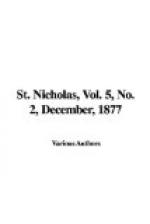Sylvie was crying too by this time, and she said nothing but “Bruno dear!” and “I never was so happy before;” though why two children who had never been so happy before should both be crying was a great mystery to me.
[Illustration: “IT’S THE LOVELIEST THING AS I NEVER SAW IN ALL MY LIFE BEFORE!”]
I, too, felt very happy, but of course I didn’t cry; “big things” never do, you know—we leave all that to the fairies. Only I think it must have been raining a little just then, for I found a drop or two on my cheeks.
After that they went through the whole garden again, flower by flower, as if it were a long sentence they were spelling out, with kisses for commas, and a great hug by way of a full-stop when they got to the end.
“Do you know, that was my river-edge, Sylvie?” Bruno began, looking solemnly at her.
Sylvie laughed merrily.
“What do you mean?” she said, and she pushed back her heavy brown hair with both hands, and looked at him with dancing eyes in which the big tear-drops were still glittering.
Bruno drew in a long breath, and made up his mouth for a great effort.
“I mean rev—enge,” he said; “now you under’tand.” And he looked so happy and proud at having said the word right at last that I quite envied him. I rather think Sylvie didn’t “under’tand” at all; but she gave him a little kiss on each cheek, which seemed to do just as well.
So they wandered off lovingly together, in among the buttercups, each with an arm twined round the other, whispering and laughing as they went, and never so much as once looked back at poor me. Yes, once, just before I quite lost sight of them, Bruno half turned his head, and nodded me a saucy little good-bye over one shoulder. And that was all the thanks I got for my trouble.
I know you’re sorry the story’s come to an end—aren’t you?—so I’ll just tell you one thing more. The very last thing I saw of them was this: Sylvie was stooping down with her arms round Bruno’s neck, and saying coaxingly in his ear, “Do you know, Bruno, I’ve quite forgotten that hard word; do say it once more. Come! Only this once, dear!”
But Bruno wouldn’t try it again.
THE MOCKING-BIRD AND THE DONKEY.
(From the Spanish of the Mexican poet Jose Rosas.)
BY WILLIAM CULLEN BRYANT.
A mock-bird in a village
Had somehow gained the skill
To imitate the voices
Of animals at will.
And singing in his prison,
Once, at the close of day,
He gave, with great precision,
The donkey’s heavy bray.
Well pleased, the mock-bird’s master
Sent to the neighbors ’round,
And bade them come together
To hear that curious sound.
They came, and all were talking
In praise of what they heard,
And one delighted lady
Would fain have bought the
bird.




